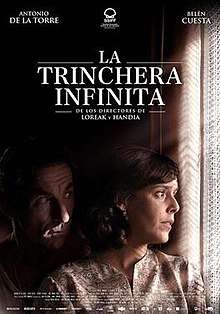The Endless Trench
The Endless Trench (Spanish: La trinchera infinita) is a 2019 Spanish historical drama film directed by Jon Garaño, Aitor Arregi and Jose Mari Goenaga.[2][3] It premiered at the 2019 San Sebastián International Film Festival, where it won the Silver Shell for Best Director and the Jury Prize for Best Screenplay.[1][4]
| The Endless Trench | |
|---|---|
 | |
| Directed by |
|
| Produced by |
|
| Written by |
|
| Starring | |
| Music by | Pascal Gaigne |
| Cinematography | Javi Agirre Erauso |
| Edited by |
|
Production company | Irusoin Moriarti Produkzioak La Claqueta PC Manny Films |
Release date |
|
| Country | Spain France |
| Language | Spanish |
At the outbreak of the Spanish Civil War in 1936, young newlyweds Higinio and Rosa are worried about the risk of reprisal killings, as Higinio is a Republican. He hides in a hole underneath their house with his wife's help. Despite the constant threat of discovery, as the Falangists search for him, the couple's love helps them to remain resilient.[1] Higonio becomes increasingly isolated in his hiding spot, where he stays until the 1969 amnesty. The story is told in chapter-like sections, each with titles alluding to the themes.
Plot
In 1936, at the start of the Spanish Civil War, a newly-married man who has criticized Franco's army and government fears that he will be the victim of reprisal killings and goes into hiding. As Falangists search for him, he hides under the floor of his house with the help of his wife. The first section, titled “campeada” ("to run”) depicts his first period where he is on the run from his pursuers.
The next section is titled “esconder” (“to hide”) shows his betrayal by his neighbor, and then his move to a trench dug under the kitchen. The next section is titled “detención” (“temporary loss of freedom”). During this section, the couple start to imagine that the Nationalists will win the civil war, but this is only a fantasy.
The next section is titled “Peligro” ("danger"). As the political situation worsens, Higinio's wife is arrested, but she does not betray her husband's hiding place. The next section is titled “encerrar” (“shut down”). It is about his isolation in his hiding spot. His wife gets pregnant with their child, and at times she is gone from the house for periods. When two gay men start staying in the house, Higinio befriends them.
The next section is called “Apartado” (“remote”). Higinio starts to feel very isolated and detached from outside world, which he can only see in glimpses through the curtains or from muffled spunds. He tries to follow the news on the radio and TV to learn more. In the “cambiar” (“change”) and “franco” (“frank”) sections, Higino goes through a major change. With the birth of his son, Higinio starts to reconsider whether he should remain in hiding. His wife tells him the family has been needing his help.
In the next section, his wife and son start to question why he remains in hiding, arguing that no one is still looking for him. In the neighborhood, it is becoming well known that he is living under the house. However, he has become habituated to his isolation, and it is hard for him to leave his hole.
The next chapter is titled “desenterrar”. Higinio realizes that it is probably safe to come out of hiding. When the Franco government announces an amnesty, and pardons him for his political offenses, he still cannot leave the trench. After 33 years, his isolation has become his normal life.
The final chapter, “Salir” (“go out”), begins when his wife, Rosa, leaves him, realizing that Higinio is too trapped in fear. Finally, he manages to leave the hole in 1969, as many other "topos" ("moles") show themselves again.
Cast
- Antonio de la Torre as Higinio Blanco, a Republican
- Belén Cuesta as Rosa, a seamstress, and Higinio's wife
- Vicente Vergara as Gonzalo
- José Manuel Poga as Rodrigo
- José María del Castillo
- Carlos Bernardino as Falangista
- Emilio Palacios as Jaime
- Enrique Asenjo
- Daniel Morilla
- Antonio Romero as Fede
- Óscar Corrales as Damián
- Manuel Domínguez as Republicano 1
- Esperanza Guardado
- Javi Mena
Release
The film had its world premiere on September 22, 2019 at the 2019 San Sebastián International Film Festival.[1]
The film was released in cinemas in Spain on October 31, 2019.[3]
References
- "La trinchera infinita / The Endless Trench". San Sebastián International Film Festival. Retrieved September 24, 2019.
- Rivera, Alfonso (22 September 2019). "Review: The Endless Trench". Cineuropa.org. Retrieved 24 September 2019.
- Belinchón, Gregorio (23 September 2019). "Viaje a unas tinieblas que duraron 30 años". El País (in Spanish). Retrieved 24 September 2019.
- Hopewell, John (28 September 2019). "'Pacified' Wins Golden Shell at San Sebastian". Variety. Retrieved 29 September 2019.